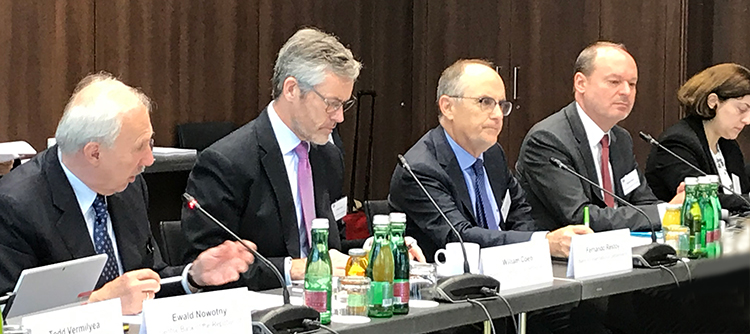BCBS-BSCEE-FSI high-level Meeting for Europe on banking supervision
Vienna, Austria, 20-21 May 2019
With the Basel III reforms now complete, senior banking supervisors from Europe, together with representatives from the private sector, academia and supervisors from other parts of the world, met to discuss current and prospective risk management and supervisory challenges in the post-crisis era.
Structural changes in banking sectors across the world, and in particular in Europe, featured prominently in discussions during the High-level Meeting for Europe on Banking Supervision. The meeting was jointly organised by the Basel Committee on Banking Supervision (BCBS), the Group of Banking Supervisors from Central and Eastern Europe (BSCEE) and the Financial Stability Institute (FSI) of the Bank for International Settlements (BIS).

A reference shareholder may help to alleviate the agency problems that arise from the separation of ownership and management; may induce a long-term view in the management of the firm; and may facilitate the adoption of a stakeholder model. This is particularly relevant in the banking business.
Participants, including speakers from the private sector, exchanged views on the main risks facing banks. They noted how the nature of the risks has changed, and now includes climate change, shifting demographics and financial technology. Banks are under strong pressure to adjust to the significant changes in the way in which financial services are delivered. Similarly, authorities are closely monitoring possible implications for the availability of financial services and the resilience of financial institutions. In this context, they are also assessing supervisory and regulatory implications, including the extent to which these changes may generate new prudential requirements. William Coen, Secretary General of the BCBS, recognised the importance of these issues for the activities of the BCBS going forward.
Against the backdrop of a stabilisation in the global regulatory framework but in a banking environment of low profitability and still relatively high operating costs, banking integration in Europe is stalling. Inconsistent implementation of post-crisis reforms across countries could create further barriers to cross-border integration of financial services, notwithstanding strong efforts already made to harmonise banking supervisory practices and regulatory convergence. Meeting participants discussed the challenges to completing the banking union in Europe, but some also wondered whether further deepening is achievable. Concentration in sovereign exposures, lack of common bank insolvency and resolution approaches, and delays in setting up a European deposit insurance guarantee system were discussed. Fernando Restoy, Chair of the FSI, pointed to the wide range of views that emerged in the discussion as testimony of the complexity of the concept of the banking union.

Banking in a number of aspects is a shrinking business - the number of banks' branches and their employees have declined since the Great Financial Crisis, and especially so in some European countries. Banks need to renew their activities to remain relevant in the new financial landscape.
The programme concluded with an exchange of views on how smaller banks, and especially financial cooperatives, can adjust to the changing landscape, where some differentiation in regulatory treatment, technological change and loss of comparative advantage are evident. Across several countries, consolidation of and reduction in the number of small banks are under way, following changes in the viability of their business model. Participants also highlighted the importance of retaining access to financial services for underserved regions and customers. However, proportionality in regulation was not universally supported, especially when banks operate across borders and tailoring of regulation may render domestic banks unsuitable for international activities. Some participants encouraged efforts to devise possible guidelines on regulatory practices for non-internationally active banks, while others cautioned against such a step, in the light of the different banking structures across countries. Michael Hysek, Chair of the BSCEE, concluded, emphasising the importance of this type of bank in many national banking sectors.


